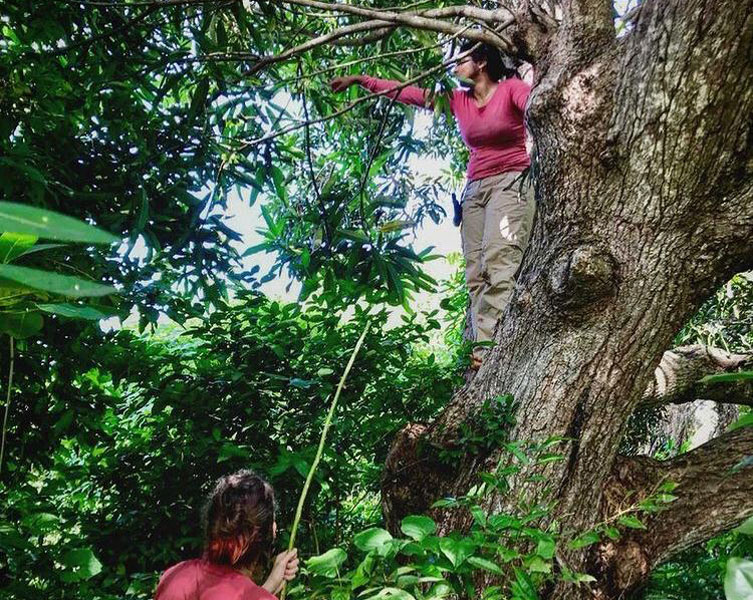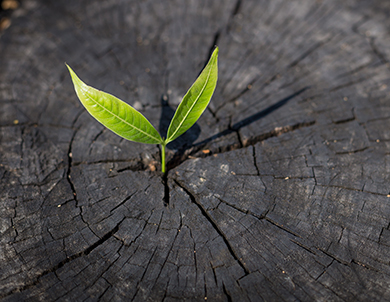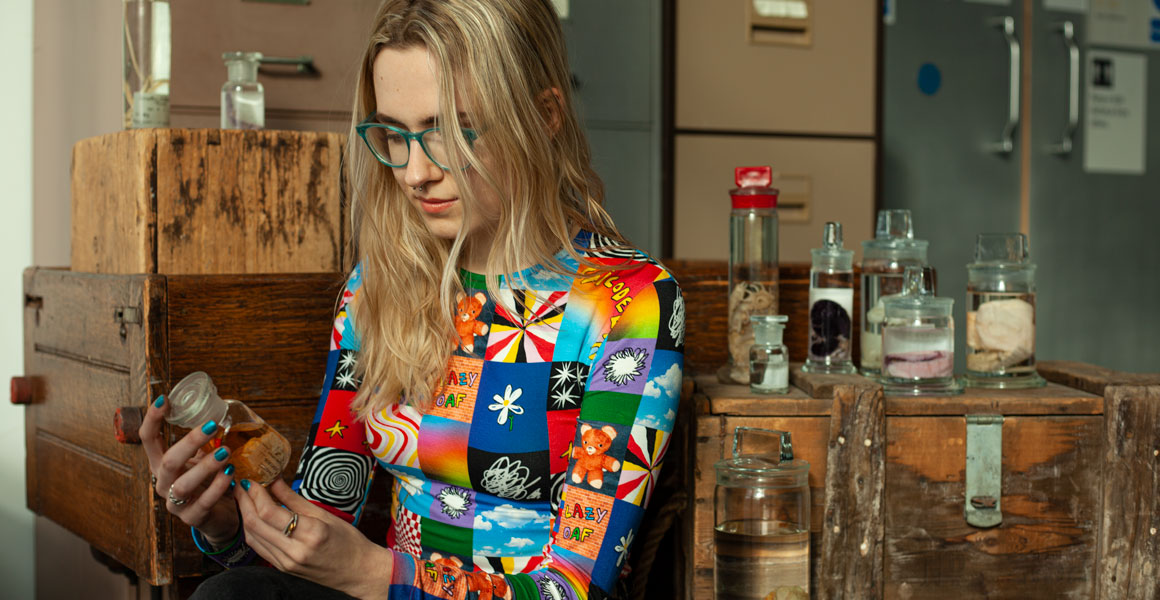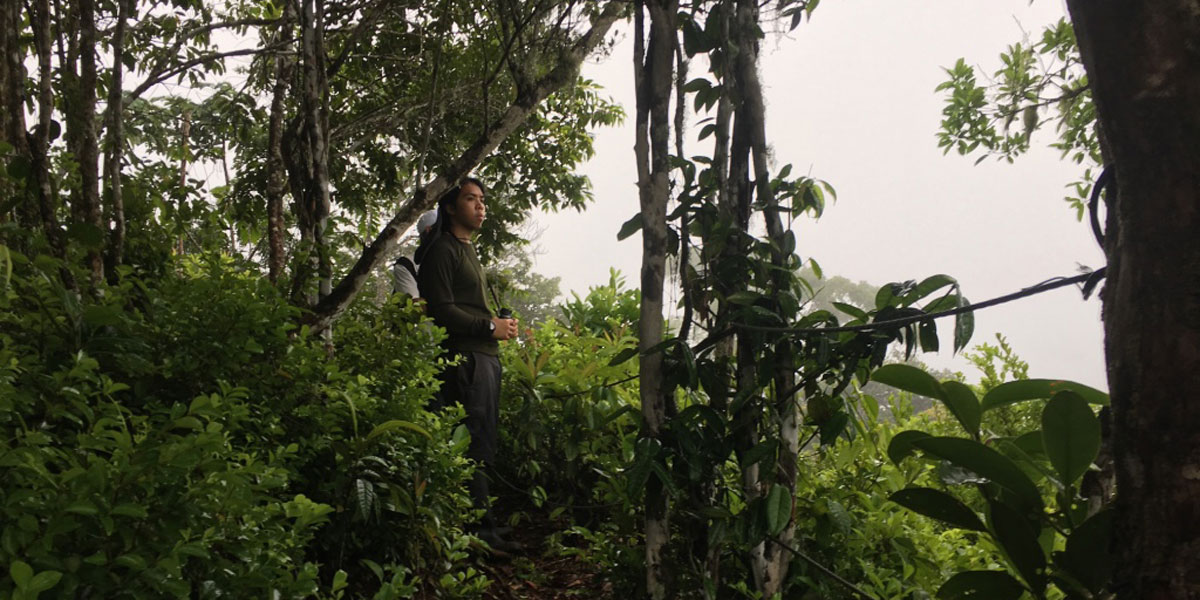Behind the Science: Ashwini Mohan highlights the challenges of being an international researcher
Indian scientist Dr Ashwini Mohan is studying genome evolution at the Museum. But securing a fellowship was no easy feat. Many scientists from developing countries who have migrated to the UK must overcome numerous hurdles before they can focus on their research.
This interview is part of a series in which we talk to young scientists and researchers about what they're working on.
You're a postdoctoral researcher at the Museum. Can you tell us how you got here?
I grew up in Bangalore, India, and I studied genetics during my undergraduate degree. Bangalore is closely located to the Western Ghats - a mountain range and a biodiversity hotspot - but I didn't have exposure to a lot of nature as a kid.
During my undergrad, I took up a few credit courses which encouraged me to explore the tropical forests in Sri Lanka. My first internship allowed me to experience and educate the public about tropical rainforests in the Western Ghats. Those experiences exposed me to the rich biodiversity in the southern regions of the Indian subcontinent, helping me to understand the sheer abundance of nature around us, which we knew so little of. That was the primary driver for me to study wildlife.
I also did my master’s degree in India. My thesis explored ecosystems on the Andaman and Nicobar Islands, which lie in the Bay of Bengal, an area between Myanmar and Sumatra. Little is known about the reptiles from those small islands separated by an oceanic barrier and whose biodiversity is more prone to extinction.
I became interested in a group of day geckos from the genus Phelsuma in Madagascar and other Indian Ocean islands. They are bright green, active during the day and are popular in the pet trade in the UK and EU.
I obtained a scholarship to do a PhD in Germany exploring the evolution of day geckos. My thesis looked at how different species in this group are related to each other, how they colonised different islands in the Indian Ocean millions of years ago, and how their populations survive today, especially with an increase in invasive species and human-made habitat changes.
I’ve always been interested in understanding how genomes evolve and how they influence all other traits, such as morphology. I started discussing this idea with my current supervisors and we decided it would be a great addition to our research. So we co-wrote a project and applied for a Marie Curie fellowship from the European Union. I was absolutely thrilled to find out that I was funded by this program and that’s what led me to working at the Museum.
What is the most challenging thing about your job?
The biggest challenge for me was to justify working in field biology as job prospects are few and far between. This is the bottleneck for most young people from middle-class families when trying to decide a career path. Most often, one is not encouraged to take up courses linked to fundamental sciences. This is usually due to the lack of monetary prospects as few commercial profit-making industries are connected to them.
I took up additional part-time jobs writing blog posts and private tutoring to support my expenses. Later, I was lucky enough to have paid internships - these were still rare a decade ago. My family lived in the capital city of my state, so I had the privilege of rent-free accommodation, food and mental health support, which are often additional challenges faced by people migrating from smaller towns and villages.
The second challenge is international mobility. Some passports are politically ‘weaker’ than others - it is often passports from nations that were previously colonised by colonising nations. This imposes a huge limitation to networking opportunities, increases costs for travel, tickets, planning and the amount of mental energy we invest into international travel. A lot of large conferences are held in wealthy western countries, which makes them hard to access. Sometimes the registration fees alone are equivalent to an entire field season’s expenditure.
Why is it important to have women in science and what have we missed out on by not allowing them into the field in the past?
I dislike justifying why women are needed in all things in life. From our history, we know progress is best made with all hands on deck. Moreover, we know how only a small demographic with inordinate amount of power can ruin millions of lives, so why are even asking this question in the twenty-first century?
I know people want to call science objective, but it’s subjective. Our ideas are subjective and a lot of our hypotheses are biased. Perspectives differ a lot between different groups of people, such as people of different gender, people living in various parts of the world, people growing up in economically diverse households and so on.
For example, there is a lot known about the vocalisation of male birds. But a group of female scientists studied the vocalisation of female birds in specific species and a lot of really interesting findings were uncovered.
Recently, another group of women scientists researched the genitalia of female snakes, which had never been done before. Research in female species is generally understudied compared to male species and this has delayed our understanding of reproductive biology and behaviour in nature.
If you look at the Museum, a lot of the collections consist of male specimens of species. Some of these species are now extinct, so we have lost - and are still losing - a lot of information about species by not including women in science.
What would you change about your profession?
I would like to bring about systemic changes that do not leave people of diverse backgrounds feeling alienated, both at local and global scales.
In science, there is massive competition for people to get long-term and permanent jobs, such as professorships or curatorial positions. There aren’t enough positions when you compare the number of people graduating with PhDs. Often, qualifications for these jobs are assessed by the number of scientific publications and projects, which pushes us all to publish as much as we can and as soon as we can. This brings forward a capitalistic side to science, which makes a lot of researchers feel insufficient even though their science, ideas and life principles would have made them great researchers and mentors.
On this path, a lot of people drop out to other fields of work, which is bound to happen. But a lot of those people are often early career women, minorities and people from historically discriminated backgrounds. Why is the system making everything extra difficult for us?
People who migrate locally or globally need to go through several additional layers of change in life, in addition to their job. For example, for people like me who come to the UK or Europe to research, the number of challenges we face is far greater than a native because we are migrating into a new country and culture. New forms, jokes, bank accounts, address registration, extending ones’ visa, immigration anxiety and much more.
All these things, like publishing and being super productive in science, weighs much more on people coming from diverse backgrounds as we leave our support systems back home and need to find new ones with time.
How could the scientific community and employers address some of the challenges international scientists face?
There needs to be some sort of time buffer to allow international scientists to set up their lives. A monetary advance to help them move to the country, such as covering visa fees and plane tickets would help alleviate a lot of stress.
I’m fortunate in that I’ve had a lot of support from colleagues at the Museum and it’s made such a huge difference in me feeling settled and getting into work. Last year, I couldn’t attend a conference because there were no visa appointments that could have given me a visa in time to visit the United States. But I received a lot of understanding and support from my colleagues and that made all the difference.
A lot of the time, these struggles get swept under the carpet and therefore are not visible or acknowledged. If someone doesn’t have a friendly environment where they feel safe to talk, then nobody else would know what they are going through as an international researcher.
To move to the UK from India, someone would need 350,000 Indian rupees, which is equivalent to around £3,360. This includes an advance to obtain a visa, pay for a plane ticket and rent a place. Double that figure for people coming from Sri Lanka, Bangladesh and Pakistan, and triple that figure for people moving from many nations in the Southern Hemisphere. No one is sitting on that kind of capital except the very rich.
Everyone knows that it’s hard for students and researchers coming from developing and economically poor nations but it’s rare that we receive advances for the move.
A colleague at the Museum asked me if I needed help with money but this is a very uncommon gesture and it still leaves me feeling emotional. Fortunately, I was migrating from Germany where I did my PhD, so I could manage financially, but if I were coming from India, I would’ve totally taken up the offer.









Don't miss a thing
Receive email updates about our news, science, exhibitions, events, products, services and fundraising activities. We may occasionally include third-party content from our corporate partners and other museums. We will not share your personal details with these third parties. You must be over the age of 13. Privacy notice.
Follow us on social media